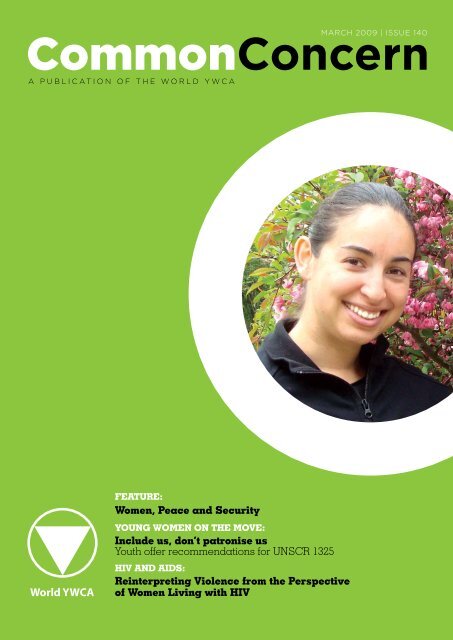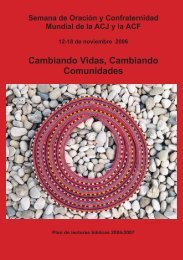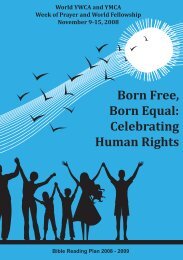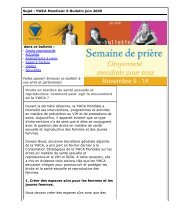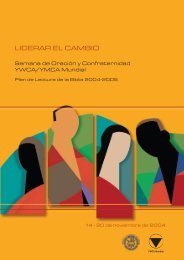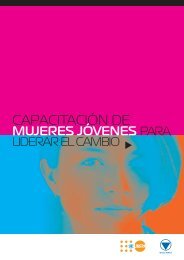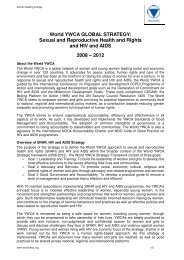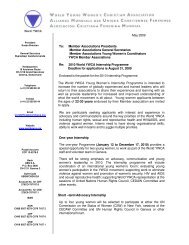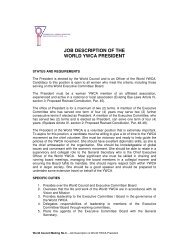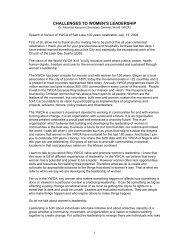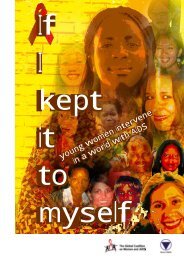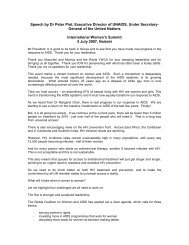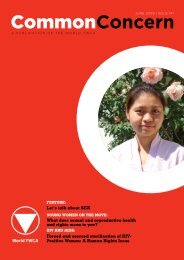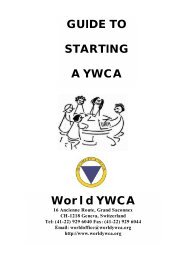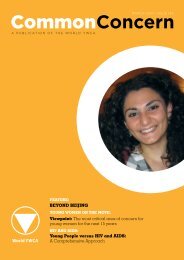Women, Peace and Security Include us, don't ... - World YWCA
Women, Peace and Security Include us, don't ... - World YWCA
Women, Peace and Security Include us, don't ... - World YWCA
You also want an ePaper? Increase the reach of your titles
YUMPU automatically turns print PDFs into web optimized ePapers that Google loves.
MARCH 2009 | ISSUE 140A PUBLICATION OF THE WORLD <strong>YWCA</strong>feature:<strong>Women</strong>, <strong>Peace</strong> <strong>and</strong> <strong>Security</strong>Young women on the move:<strong>Include</strong> <strong>us</strong>, don’t patronise <strong>us</strong>Youth offer recommendations for UNSCR 1325hiv <strong>and</strong> aids:Reinterpreting Violence from the Perspectiveof <strong>Women</strong> Living with HIV
CC 2Contents03 | Editorial04 | <strong>YWCA</strong>s Around the <strong>World</strong><strong>Peace</strong> with j<strong>us</strong>tice has always been an importantpriority for the <strong>World</strong> <strong>YWCA</strong>. In thissection, we highlight <strong>YWCA</strong>s working incountries that have been through conflict.HIV <strong>and</strong> aids18Reinterpreting Violence fromthe Perspective of <strong>Women</strong> Livingwith HIVFeature6<strong>Women</strong>,<strong>Peace</strong><strong>and</strong> <strong>Security</strong>:Human insecurities includinglack of social, political, economic <strong>and</strong>environmental security prevent womenfrom attaining gender equality <strong>and</strong>empowerment.Take Action11 | Keeping UNSCR 1325 alive:Ensuring women’s full participation inpeace-building <strong>and</strong> conflict resolution12 | Case studies: Post-election crisis inKenya <strong>and</strong> ZimbabweYoung <strong>Women</strong> on the Move14 | <strong>Include</strong> <strong>us</strong>, don’t patronise <strong>us</strong>Youth offer recommendations forUNSCR 1325Leading Change16Journey to lasting peace:When conflict inspires womento find solutions. How the <strong>YWCA</strong> of DRCchampioned UNSCR 1325Briefing20 | From the <strong>World</strong> <strong>YWCA</strong>23 | People23 | SupportersPresident: S<strong>us</strong>an Brennan General Secretary: NyaradzayiGumbonzv<strong>and</strong>a Editor: Kaburo Kobia Co-ordinators: SarahDavies, Sylvie Jacquat Distribution: Fiona Wilkie. Articles may befreely reproduced with acknowledgement to <strong>World</strong> <strong>YWCA</strong> CommonConcern ISSN 1025-4099. All artwork, images <strong>and</strong> photographyis protected by copyright <strong>and</strong> may not be reproduced withoutpermission. ©2008 <strong>World</strong> <strong>YWCA</strong>.Common Concern is published in French <strong>and</strong> Spanish, contactworldoffice@worldywca.org to order.On the Cover: Andrea Núñez Argote, <strong>YWCA</strong>Intern 2009 <strong>and</strong> Board Secretary for the <strong>YWCA</strong>of Naucalpan, Mexicowww.worldywca.org
CC 3EditorialS<strong>us</strong>an Brennan<strong>World</strong> <strong>YWCA</strong> PresidentWe are called to bepeace makers. Butpeace is not passivity<strong>and</strong> peace makingrequires strength, courage <strong>and</strong>persistence. In the home, in themarketplace, in the village <strong>and</strong> in theworld, women’s safety dem<strong>and</strong>s oururgent attention. The statistics aregrim: one in three women worldwidewill be a victim of violence in herlifetime. <strong>YWCA</strong>s across the worldare responding by providing shelter,protesting against war, supportingwomen in conflict areas <strong>and</strong> urgingwomen’s participation in democracy<strong>and</strong> conflict resolution. This issue ofCommon Concern explores a key toolin our advocacy for a world free fromviolence: the United Nations <strong>Security</strong>Council Resolution 1325 on women,peace <strong>and</strong> security.In 2007, at the initiative of the<strong>YWCA</strong> of the Democratic Republicof Congo (DRC), the <strong>World</strong> <strong>YWCA</strong>Council resolved to promote thisresolution, m<strong>and</strong>ating our movementto educate ourselves <strong>and</strong> othersabout women’s right to participate inbuilding the peace.Pacific peace-advocate, SharonBhagwan Rolls, reminds <strong>us</strong> in thefeature article that security for womenis not j<strong>us</strong>t about living without war, butrequires <strong>us</strong> to be safe in private <strong>and</strong>in public. The <strong>YWCA</strong> of DRC explainsin the Leading Change section thatwomen m<strong>us</strong>t have access to decisionmakingto ensure their needs are metduring <strong>and</strong> after conflict. Our GeneralSecretary contributes to Take Action:women m<strong>us</strong>t realise that power is nevergiven; even where there are quotas onem<strong>us</strong>t assert, affirm, negotiate, position<strong>and</strong> present oneself as a leader.The stories in this issue ill<strong>us</strong>tratehow <strong>YWCA</strong>s are building leaderscommitted to creating a safe world,working with former female soldiersin Liberia, participating in peaceprotests in Colombia, supportingwomen in conflict zones in Georgia<strong>and</strong> the Middle East, providing asafe place in Zimbabwe—every day,<strong>YWCA</strong>s are helping women live livesfree from violence.Building on this commitment, thechosen theme for the 2011 <strong>World</strong><strong>YWCA</strong> Council is ‘<strong>Women</strong> Creatinga Safe <strong>World</strong>’. To be held in Zurich,Switzerl<strong>and</strong> from July 10-16, 2011, theCouncil theme speaks to the very coreof our <strong>World</strong> <strong>YWCA</strong> vision—a fullyincl<strong>us</strong>ive world where j<strong>us</strong>tice, peace,health, human dignity, freedom <strong>and</strong>care for the environment are promotedthrough women’s leadership.Arundhati Roy 1 wrote: “I am notadvocating tolerance, or acceptance.There has been more than enoughof that. I’m advocating a war of noisybeauty, of voices raised, of stories told,of songs sung loudly in the streets.”The <strong>YWCA</strong> is a powerful chor<strong>us</strong>of women leading change—with ourwords, our actions, our service <strong>and</strong>our vision, we make a mighty song forpeace. •1 Arundhati Roy, from India, is a young femaleactivist <strong>and</strong> author of ‘The God of Small Things’.www.worldywca.org
CC 4<strong>YWCA</strong>s Aroundthe <strong>World</strong><strong>Peace</strong> with J<strong>us</strong>tice has always been an important priority for the <strong>World</strong> <strong>YWCA</strong>. For overone <strong>and</strong> a half centuries, the <strong>YWCA</strong> movement has been sensitive to the particular situationwomen <strong>and</strong> young women face during conflict <strong>and</strong> war. In this section, we highlight<strong>YWCA</strong>s working in countries that have survived conflicts the world has forgotten…<strong>Women</strong> in Georgia still in needThe conflict that broke out in South Ossetiabetween R<strong>us</strong>sia <strong>and</strong> Georgia on Aug<strong>us</strong>t 8, 2008left a population of nearly 160,000 internallydisplaced, many of whom were women <strong>and</strong>children. The <strong>YWCA</strong> of Georgia mobilised to collect money<strong>and</strong> essential items for women <strong>and</strong> children that werethen distributed through kindergartens <strong>and</strong> schools in thecapital T’bilisi.Although the conflict is over, the consequences remain.“Instability, social problems <strong>and</strong> fear of future conflict arethe main concerns of Georgian women,” says Eka Avaliani,President of the <strong>YWCA</strong> of Georgia. “Many women live withoutany income as their h<strong>us</strong>b<strong>and</strong>s, brothers <strong>and</strong> fathers weremurdered during the conflict. There were no support servicesfor women when the country was engaged in war <strong>and</strong>humanitarian access to affected areas has been limited.”The <strong>World</strong> <strong>YWCA</strong> urged women to be part of the peacenegotiations as recommended in the United Nations<strong>Security</strong> Council Resolution 1325 on women, peace <strong>and</strong>security. UNSCR 1325 calls for women’s full participationin conflict resolution <strong>and</strong> the <strong>YWCA</strong> of Georgia continuesto call for women to be heard. “<strong>Peace</strong> is important for allwomen around the world <strong>and</strong> Georgian women are notexempt in this,” says Avaliani, ”Georgian women shouldhave the chance to choose a future for their state, families,children <strong>and</strong> themselves in a peaceful atmosphere.”Since the 1940s Colombians have lived with civilconflict motivated by differing ideologies of conservative<strong>and</strong> liberal politics. “This provoked the creation ofguerilla <strong>and</strong> paramilitary groups who promised theywould seek equality <strong>and</strong> social j<strong>us</strong>tice, which has neverbeen achieved,“ says Judith Melo Barrera, President ofthe <strong>YWCA</strong> of Colombia. “<strong>Women</strong> are the most affectedby this conflict, which is reflected amongst the displacedpopulation. Many become widows beca<strong>us</strong>e of the war.<strong>Women</strong> have to take on the paternal role in families <strong>and</strong>this is why we ask for peace in Colombia.”The <strong>YWCA</strong> of Colombia has participated in all of thepeace marches promoted by Colombian civil society. “ Weconsider it our civic duty. <strong>Women</strong> in our association wantour efforts of promoting women’s rights to be visible to thecommunity <strong>and</strong> working with different community sectorsfor peace compliments the objectives of the <strong>YWCA</strong>,” saysBarrera.<strong>Women</strong> in Colombia want peaceThe world celebrated when Ingrid Betancourt <strong>and</strong>14 other hostages held in the Colombian junglefor up to ten years were rescued <strong>and</strong> freed in July2008. The <strong>YWCA</strong> of Colombia marched throughthe streets of Bogotá to commemorate the liberation of thehostages <strong>and</strong> call for peace in their country.Members of the <strong>YWCA</strong> of Colombia participate in a peaceful protest on thestreets of Bogotá. 2008www.worldywca.org
<strong>YWCA</strong>s Around the <strong>World</strong>CC 5Participants at a joint youth conference on peace building hosted by <strong>YWCA</strong>s of Japan <strong>and</strong> Korea.Youth hold key to peace in JapanThe <strong>YWCA</strong> of Japan is a defender of peace. As theonly country to experience the devastation of twoatomic bombs, the association is committed topeace education throughout Japan <strong>and</strong> the world.The <strong>YWCA</strong> of Japan <strong>Peace</strong> Education Fund supportsnational peace programmes that involve cooperation <strong>and</strong>participation from <strong>YWCA</strong>’s international networks. “The fundwas launched to promote peace building with the visionof the world as one community <strong>and</strong> to spread the peacemessage to youth through vario<strong>us</strong> programmes,“ says Dr.Mayako Ishii, President of the <strong>YWCA</strong> of Japan.Through the fund, a number of initiatives evolvedincluding a ‘Pilgrimage to Hiroshima’ that involved over80 youth from <strong>YWCA</strong> of China, Korea, Palestine <strong>and</strong> manyinternational students. Participants shared <strong>and</strong> developedideas for building world peace. “The <strong>YWCA</strong> of Japaninvolves youth for a more powerful peace movementworldwide.” Other initiatives include youth conferences,internships, <strong>and</strong> volunteer opportunities.<strong>Women</strong> are at the heart of <strong>YWCA</strong> of Japans peaceprogrammes. “<strong>Women</strong> are still marginalised in manysocieties <strong>and</strong> Japan is no exception. Unless women are atthe decision-making table, women continue to be at risk offacing violations of human rights. That is why peace is thevery first priority of <strong>YWCA</strong> of Japan.”From the archivesWhen the United States of Americaentered <strong>World</strong> War I, the <strong>YWCA</strong> USAjoined the United War Work Campaignto raise <strong>and</strong> distribute funds to aidwar relief efforts. As the only women’sorganisation in the Campaign, the<strong>YWCA</strong>’s charge was to meet the specialneeds of women <strong>and</strong> girls affectedby the war. The <strong>YWCA</strong> raised money,recruited war workers <strong>and</strong> run Ind<strong>us</strong>trialWar Service Centres or ‘blue triangle’ho<strong>us</strong>es. The centres provided a safespace for working women <strong>and</strong> servedaround 3,000 women during the war.Ref: <strong>YWCA</strong> of the U.S.A. Records, Sophia SmithCollection, Smith College, Northampton, Mass.Journal of <strong>Women</strong>’s History, Vol 19 No.2, pg 97. 2007www.worldywca.org
CC 6FeatureWOMEN, PEACE<strong>and</strong> SECURITY<strong>Security</strong> Council Resolution 1325 was passed unanimo<strong>us</strong>ly on October 31, 2000.Resolution (S/RES/1325) is the first resolution ever passed by the <strong>Security</strong> Council thatspecifically addresses the impact of war on women, <strong>and</strong> women’s contributions to conflictresolution <strong>and</strong> s<strong>us</strong>tainable peace.When it comes to gender,traditional notions ofsecurity <strong>and</strong> conflictreflect only a narrowreality for women. Human insecuritiesincluding lack of social, political,economic <strong>and</strong> environmental securityprevent women from attaining genderequality <strong>and</strong> empowerment. Whenthere is a lack of security—women<strong>and</strong> girls bear the brunt of the crisis.The impact of conflict, war, poverty<strong>and</strong> even economic crisis on women isoften disproportionate.So, on October 31, 2000, whenthe United Nations <strong>Security</strong> Counciladopted Resolution 1325 on <strong>Women</strong>,<strong>Peace</strong> <strong>and</strong> <strong>Security</strong> it was regarded asgroundbreaking, not only in content butas proof of the achievements that arepossible when NGOs, the UN system<strong>and</strong> member states work together.The UN <strong>Security</strong> CouncilResolution 1325 (UNSCR 1325) putsthe spotlight on three critical areaswhen it comes to gender equalityin the context of conflict, peace <strong>and</strong>security: Participation, Prevention <strong>and</strong>Protection. These 3Ps clearly addressthe constant under-representation ofwomen in formal peace processes,how women can contribute topreventing war <strong>and</strong> conflict <strong>and</strong> thespecific needs of women <strong>and</strong> girlsduring conflict.ParticipationWhen women face violencein the home <strong>and</strong> communitythey often do not have theenergy to fully participatein peace building at thenational, provincial or eventhe local committee level.Since the feminization of povertybecomes even more pronounced inpost conflict economies, potentialfemale leaders may be put offparticipating in the transformativeprocesses of reconstruction <strong>and</strong>rebuilding communities as they caterto basic needs of their families.Ultimately, the full <strong>and</strong> equalparticipation of women during thepeace building processes starts withintervention, funding <strong>and</strong> technicalsupport for women that allows themto both participate <strong>and</strong> meet theirbasic survival needs. But to bridgethe participation gap, women m<strong>us</strong>tbe involved in political process beforeconflict breaks out.Too often women’s opinion onpeace <strong>and</strong> security are not heardbeca<strong>us</strong>e they are excluded fromthe process or their contributions<strong>and</strong> opinions are devalued. Toovercome these obstacles, women’sparticipation m<strong>us</strong>t be deliberatelysought, perhaps through a quotasystem, targeted consultations, theestablishment or strengthening of<strong>Women</strong>’s Ministries or Departments<strong>and</strong> the appointment of female judges,police <strong>and</strong> law reform authorities.<strong>Women</strong>’s formal politicalparticipation in decision-makingat the vital stage of peace buildingdem<strong>and</strong>s more than having women asobservers in decision-making fora <strong>and</strong>it constitutes more than a few womenc<strong>and</strong>idates st<strong>and</strong>ing for elections.Gender j<strong>us</strong>tice <strong>and</strong> equality principlesshould be enshrined in constitutional<strong>and</strong> legal reforms, multi-party systems<strong>and</strong> election processes. Once womenare participating in public life, theyshould be included in decision-makingabout issues beyond gender; theyshould also be included in disc<strong>us</strong>sionsabout security <strong>and</strong> resource allocation.www.worldywca.org
FeatureCC 7In order to adequately protectwomen <strong>and</strong> girls, governments shouldensure gender sensitivity training ofsecurity sector personnel <strong>and</strong> utilisetools such as gender-based earlywarningindicators.It is critical that government troop<strong>and</strong> police engage gender experts <strong>and</strong>expertise to be included in all levels<strong>and</strong> aspects of peace operations,including in technical surveys, thedesign of concepts of operation,training, staffing <strong>and</strong> programmes. Inaddition, protection m<strong>us</strong>t be extendedto female officers <strong>and</strong> police.Community police initiatives canalso be enhanced through regularengagement with women’s groups,<strong>and</strong> the recruitment of women withexpertise <strong>and</strong> life experience incommunity policing programmes.Participants at a workshop on women peace <strong>and</strong> human security display a poster they created on thetheme My Life, My Issues, My <strong>Peace</strong>. Nadi, Fiji.Gaps <strong>and</strong> opportunitiesfor actionPreventionFor women, more guns doesnot mean more security.Through women’s eyes, thereis a broader notion of security– one that is defined in human,rather than in military terms.<strong>Women</strong> who are most affectedby guns often have the best ideasabout how to remove them from thecommunity. After all, can women reallyexperiencing peace when arms arestill present in society?The masculinity of militarisation<strong>and</strong> the need to promote ‘soft power’as an alternative to current styleof decision-making m<strong>us</strong>t be takeninto account. Advocates of UNSCR1325 have to recognise the needto be vigilant <strong>and</strong> proactive aboutinfluencing the regional humansecurity agenda, especially at nationallevel. It is time that governmentsharmonise UNSCR 1325 with national,state <strong>and</strong> local legislation.<strong>YWCA</strong>s <strong>and</strong> the women’smovement m<strong>us</strong>t together reaffirmthat militarisation does not bringpeace or security—not to ourworld or our nations, not to ourcommunities <strong>and</strong> not into our homes.We have to find alternatives. Theconsequences of women’s excl<strong>us</strong>ion<strong>and</strong> marginalisation pose a significantthreat to s<strong>us</strong>tainable human security.In order to prevent war <strong>and</strong> conflict, weneed women’s perspective for peaceat all times.ProtectionWhen war, conflict or unrestdo occur, UNSCR 1325 callson member states to respectinternational law regardingthe rights <strong>and</strong> protection ofwomen <strong>and</strong> girls, especiallyas civilians. <strong>Women</strong> <strong>and</strong> girlsare often targets for sexualviolence <strong>and</strong> ab<strong>us</strong>e duringconflict.Eight years on, despite theconsistent call for UN memberstates to develop clear strategies<strong>and</strong> action plans “with goals <strong>and</strong>timetables on the integration ofgender perspectives in humanitarianoperations, rehabilitation <strong>and</strong>reconstruction”, there remain gaps inthe implementation of UNSCR 1325.As such, the UN Secretary-General’s October 13, 2004 report onthe Resolution requests member statesto develop National Action Plans (NAP).The National Action Plan processidentifies gaps in knowledge,provides opportunities for informationsharing <strong>and</strong> training <strong>and</strong> generatescommitment <strong>and</strong> ownership.The result is a coordinatedgovernmental approach that has thefull support of civil society actors.Effective collaboration betweenDepartments of Foreign Affairs withthe women’s machinery as well asmilitary <strong>and</strong> police in the development<strong>and</strong> implementation of NAPs is a cleardemonstration that governments aretaking gender equality commitmentsserio<strong>us</strong>ly.www.worldywca.org
CC 8featureUNSCR 1325 is not an impractical wish list, but a range of recommendations which canassist UN member states make good on gender equality commitments based on women’sexperiences <strong>and</strong> realitiesNAPs assist governments inestablishing a comprehensive<strong>and</strong> coordinated approach, raisethe awareness of analytical <strong>and</strong>operational personnel, enhance theownership <strong>and</strong> accountability of allstaff to the government’s commitment<strong>and</strong> support efforts at monitoring <strong>and</strong>evaluation.AdvocacyAnd so when it comes to it,women’s participation, the protectionof women <strong>and</strong> girls <strong>and</strong> incorporatingUNSCR 1325 in peacekeeping <strong>and</strong>peace support operations still have along way to go.The global women’s movement,in particular international networkssuch as the <strong>World</strong> <strong>YWCA</strong> <strong>and</strong> the NGOWorking Group on <strong>Women</strong>, <strong>Peace</strong><strong>and</strong> <strong>Security</strong> provide an importantopportunity for women of the globalsouth, in particular, to link theiraspirations <strong>and</strong> visions for peace <strong>and</strong>inform the deliberations <strong>and</strong> workof the UN <strong>Security</strong> Council. Suchtransnational collaboration can, forexample, assist UN member states todeliver their final <strong>and</strong> tested NationalAction Plan to the 10th anniversarysession of the Human Rights Council inOctober 2010.Transnational collaboration is alsoimportant to assist in mobilising thenecessary financial <strong>and</strong> technicalresources to assist women advancetheir visions for peace into the policyarena.UNSCR 1325 is not animpractical wish list, but a range ofrecommendations which can assistUN member states make good ongender equality commitments basedon women’s experiences <strong>and</strong> realitiesnot only during the conflicts, but alsoin the contest of conflict prevention. Byenabling <strong>and</strong> contribution to NationalAction Plans, making the linkages withthe implementation of CEDAW, theBeijing Platform for Action as well asthe Millennium Development Goals,women can partner to ensure a worldwith peace <strong>and</strong> security for all.By Sharon Bhagwan Rolls –Coordinator, femLINKPACIFIC(www.femlinkpacific.org.fj)Sharon is the founding member offemLINKPACIFIC: Media Initiatives for<strong>Women</strong>. She hasbeen a memberof the <strong>YWCA</strong> ofFiji since 1986,which has been theinspiration of herwork as a mediapractitioner <strong>and</strong>communicator aswell as in her faithjourney.For more on UNSCR 1325 visit:www.peacewomen.orgwww.iwtc.orgwww.femlinkpacific.org.fj/<strong>Security</strong> through a woman’s eyesEcelini Weleilakeba64, FijiActivelyinvolvedwith the<strong>YWCA</strong> ofFiji since the 1960s,Ecelini was the onlyFiji delegate to the2003 <strong>World</strong> <strong>YWCA</strong>Council in Brisbane <strong>and</strong> led the Fijidelegation to the 2007<strong>World</strong> Council inNairobi. She has served as Treasurer,Vice President <strong>and</strong> Interim President ofYCWA of Fiji.What does it mean to live withconflict/war?Living with coups in Fiji, meansliving with uncertainty making it difficultto make plans <strong>and</strong> commit funds toplans. It also means one has to be morecareful of what one says <strong>and</strong> to whom<strong>and</strong> there are new challenges to testour communications skills.What indigeno<strong>us</strong> process/practice can bring peace orprevent conflict?There are traditional practices <strong>and</strong>processes of communication that aremainly non-confrontational. In Fiji anexample is the practice of veisiko orvisit, similar to an appointment throughwhich disc<strong>us</strong>sions can take place in anenabling environment.How can women contribute topeace building?<strong>Women</strong> can contribute byfoc<strong>us</strong>ing on building the capacity oftheir families <strong>and</strong> communities <strong>and</strong>continuing to be actively engagedin promoting dialogue <strong>and</strong> keepingcommunication lines open within theircommunities. It is important, thoughdifficult, to continue with club activities.After the 2000 coup in Fiji, in the spiritwww.worldywca.org
FeatureCC 9of veisiko, a group of women leadersvisited the Comm<strong>and</strong>er of the Militaryat the military camp to disc<strong>us</strong>s withhim their grievances concerningthe coup—it was a peaceful visitdemonstrating how women cancommunicate peacefully.What do you want to see yourgovernment do differently?I would like to see the governmentdemonstrate the political will to listenserio<strong>us</strong>ly to the voice of women <strong>and</strong>youth, respectfully acknowledge therole of women <strong>and</strong> youth <strong>and</strong> valuetheir skills <strong>and</strong> talent in the process ofnation building.Korpu Yarkpa30, LiberiaFor nearly 14 years, Liberiawas engaged in several civilwars. More than 200,000people were killed duringthe conflict. Korpu, barely 11 years oldwhen the war started, was among theover 30,000 women <strong>and</strong> girls who tookarms during the civil wars. She is nowa seamstress <strong>and</strong> beneficiary of the<strong>YWCA</strong> of Liberia female combatantsrehabilitation programme.What does it mean to live withconflict/war?I come from Bong County, Liberia.My life before the war was at leastbetter beca<strong>us</strong>e my parents weretaking care of my schooling <strong>and</strong> mywellbeing. During the war, my first roleas a female combatant was to preparefood for combatants on the front-line<strong>and</strong> then eventually I took arms <strong>and</strong>became a real female combatant.What motivated you to become acombatant?The most vivid memory I have of thewar was how I lost my oldest brotherwho kept our home in order. He wasbeheaded right before my eyes <strong>and</strong>this is why I became a combatant…to protect my mother. My mother wasreally affected by the war, she lost heroldest son who was not a soldier orcombatant <strong>and</strong> she had to leave herhome to find a place to live. On herreturned, her ho<strong>us</strong>e was burnt down.She had nothing left.How did being a combatantaffect your life?My ten years as a combatantwas all wasted time. I ended up in aposition where I learning nothing. Ona day-to-day basis I had to answer tothe calls of all General Comm<strong>and</strong>ersin any way they needed me. My ordealcame to an end when I realised thatmy peers were improving their lives<strong>and</strong> becoming better citizens <strong>and</strong> Iwas not.How has your life changedsince the end of the war?I have been fully rehabilitationinto my community through the<strong>YWCA</strong> of Liberia programme. I haveparticipated in the skills training <strong>and</strong>learnt tailoring.What do you want to see yourgovernment to do differently?What should have been doneto improve the peace buildingprocess in Liberia was to allow allfemale combatants to go throughrehabilitation centers so as to recoverpsychologically from the effects ofarmed conflict. Today, I see my countryLiberia as a good country, sincethe war, things have improved <strong>and</strong>everyone now knows that war is not ananswer to any problem.Arda Aghazarian28, PalestineFor mostyoungpeople,a lifeunder occupation isunimaginable. Forthe young peopleof Palestine, it is a daily reality. Arda,<strong>World</strong> <strong>YWCA</strong> Board member <strong>and</strong><strong>YWCA</strong> of Palestine member for overseven years shares her experience.How long have you lived witharmed conflict?Since <strong>and</strong> before I was born.My parents also grew up in anenvironment of conflict, as did mygr<strong>and</strong>parents before them. It willprobably last for a while…How does this affect you as ayoung woman?One of the big effects of a conflictenvironment is that there is nomomentum. There’s always the fearthat something might happen <strong>and</strong> ruinall plans; that fear isn’t coming fromnowhere. It’s difficult to plan ahead ormove forward in such an environment,as things are always changing one wayor another <strong>and</strong> influencing one’s life.Are there any positive outcomesof growing with conflict?It forces individuals to deal withreality. There is unfortunately not muchchoice around it, but conflict enhancesone’s survival instincts, levels of copingas well as not taking so much forgranted.What one thing would you liketo change to improve yoursituation?Not letting actions <strong>and</strong> reactionsbased on racism pass before my eyeswithout acting.How do you think young womencan best contribute to the ca<strong>us</strong>eof peace?In their knowledge, persistence <strong>and</strong>raising awareness regarding the rightto live in peace <strong>and</strong> j<strong>us</strong>tice despite allthe craziness <strong>and</strong> troubles around.www.worldywca.org
CC 10featureSimplified version of UNSCR 1325 onwomen, peace <strong>and</strong> security prepared by theInternational <strong>Women</strong>’s Tribune Centre12345678Increase the number of women at decisionmakinglevels in national, regional <strong>and</strong>international institutions involved in preventing,managing, <strong>and</strong> resolving conflicts.Increase participation of women at decisionmakinglevels in conflict resolution <strong>and</strong> peaceprocesses.Provide women c<strong>and</strong>idates from a regularupdated,centralised roster for appointment asspecial representatives <strong>and</strong> envoys to facilitate theappointment of more women in these positions.Exp<strong>and</strong> the numbers <strong>and</strong> roles of women in UNfield operations, such as military observers,civilian police, human rights <strong>and</strong> humanitarianpersonnel.Ensure that a gender component is included infield peacekeeping operations.Provide training guidelines <strong>and</strong> materials on(1) the protection, rights, <strong>and</strong> needs of women,(2) the importance of involving women inpeacekeeping <strong>and</strong> peace-building measures,<strong>and</strong> (3) HIV/AIDS awareness in national trainingprograms for military police, civilian police <strong>and</strong>civilian peacekeeping personnel.Increase voluntary financial, technical <strong>and</strong>logistical support for gender-sensitive training.Adopt a gender perspective when negotiating <strong>and</strong>implementing peace agreements in areas like:» Special needs of women <strong>and</strong> girls duringrepatriation <strong>and</strong> resettlement <strong>and</strong> forrehabilitation, reintegration <strong>and</strong> post-conflictreconstruction.» Support local women’s peace initiatives <strong>and</strong>indigeno<strong>us</strong> processes for conflict resolution<strong>and</strong> involve women in all of the peaceagreement implementation mechanisms.» Ensure the protection of <strong>and</strong> respect for humanrights of women <strong>and</strong> girls, particularly relatingto the constitution, electoral system, the police<strong>and</strong> judiciary.www.worldywca.org91011121314151617Respect international law regarding the rights<strong>and</strong> protection of women <strong>and</strong> girls, especially ascivilians, during armed conflicts.Take special measures to protect women <strong>and</strong>girls from gender-based violence, particularlyrape <strong>and</strong> other forms of sexual ab<strong>us</strong>e <strong>and</strong>violence in situations of armed conflict.Put an end to impunity <strong>and</strong> prosecute thoseresponsible for genocide, crimes againsthumanity, war crimes, including those relatingto sexual <strong>and</strong> other violence against women <strong>and</strong>girls, <strong>and</strong> exclude these crimes from amnestyprovisions.Respect the civilian <strong>and</strong> humanitarian characterof refugee camps <strong>and</strong> settlements <strong>and</strong>, in theirdesign, take into account the particular needs ofwomen <strong>and</strong> girls.Consider the different needs of female <strong>and</strong> maleex-combatants in the planning for disarmament,demobilization <strong>and</strong> reintegration <strong>and</strong> take intoaccount the needs of their dependants.Give consideration to the potential impact ofUN Charter Article 41 on the civilian population,keeping in mind appropriate humanitarianexemptions <strong>and</strong> the special needs of women.Ensure the <strong>Security</strong> Council missions take intoaccount gender considerations <strong>and</strong> the rightsof women, including through consultations withlocal <strong>and</strong> international women’s groups.Conduct a study on (1) the impact of armedconflict on women <strong>and</strong> girls, (2) the role ofwomen in peace-building <strong>and</strong> (3) the genderdimensions of peace processes <strong>and</strong> conflictresolutions. Submit the results to the <strong>Security</strong>Council <strong>and</strong> make the study available to all UNMember states.Report progress to the <strong>Security</strong> Council ongender main-streaming throughout peacekeepingmissions <strong>and</strong> all other aspects relating to women<strong>and</strong> girls.
CC 12Take Actionpolitical will backed-up with knowledge,skills <strong>and</strong> gender perspectives thatbring a qualitative contribution toconflict prevention, negotiations <strong>and</strong>peace building.Secondly, it is also clear that womenm<strong>us</strong>t accept that power is never given—even where there is a quota system,one has to assert, affirm, negotiate,position <strong>and</strong> present oneself as a leader.Therefore, growing <strong>and</strong> nurturing theleadership of women lies at the heart ofimplementing these resolutions. Thirdly,it is about resources. Implementingthese resolution dem<strong>and</strong>s financialresources, time, skills <strong>and</strong> expertise.Investments in women <strong>and</strong> girls inpeace building means a conscio<strong>us</strong>approach for resource prioritisation bythe vario<strong>us</strong> actors <strong>and</strong> communities.Lastly, the human rights ofwomen <strong>and</strong> men m<strong>us</strong>t be affirmed.Acknowledging the life long yearningfor humanity to live a life with dignity,in safety <strong>and</strong> with security, withthe necessary freedoms <strong>and</strong> theaccompanying responsibilities, iscrucial in ensuring internationalinstruments on peace <strong>and</strong> j<strong>us</strong>tice areeffectively implemented.The <strong>YWCA</strong> as a movement, foundedon Christian basis, continues to affirmthe mystery of creation, the uniquenessof being <strong>and</strong> the complimentary of lifeforms. Our nations lose direction whenthe spirit within is suppressed <strong>and</strong>not nurtured, egos become the being,power to dominate creates strife <strong>and</strong>conflict. We m<strong>us</strong>t continue to reachdeep within for the spirit of sharing,respect <strong>and</strong> giving.By Nyaradzayi Gumbonzv<strong>and</strong>a,<strong>World</strong> <strong>YWCA</strong> General SecretaryCase studies:Post-electioncrisis in Kenya<strong>and</strong> ZimbabweIn 2008, Kenya <strong>and</strong> Zimbabwe held general elections that endedin violence <strong>and</strong> instability. The <strong>YWCA</strong> movement responded withcompassion <strong>and</strong> a sense of urgency. This extract, from a reportby Hélène Yinda, Regional Director for Africa <strong>and</strong> the MiddleEast, on the <strong>World</strong> <strong>YWCA</strong>’s response to post-election conflict inKenya <strong>and</strong> Zimbabwe identifies the actions taken immediatelyfollowing the elections.Struggle forsurvival in ZimbabweIn Zimbabwe, political violencecharacterised the March 2008general elections <strong>and</strong> theensuing June run-off election.The context in Zimbabwe wasexacerbated by the dire economicsituation <strong>and</strong> lack of political spacein Zimbabwe before the electionsas well as the targeted internationalsanctions imposed on the country forseveral years.In response to the post-electioncrisis, which lasted six months,international aid <strong>and</strong> interventionswere restricted in the country.Nevertheless, the <strong>World</strong> <strong>YWCA</strong>began working with the <strong>YWCA</strong> ofZimbabwe even before the electionsgiving special support in responseto the economic crisis. The <strong>YWCA</strong> ofZimbabwe received an invitation toofficially observe the election <strong>and</strong> the<strong>World</strong> <strong>YWCA</strong> encouraged the <strong>YWCA</strong>of Zimbabwe to integrate advocacyinto their services work. Nearly 100<strong>YWCA</strong> members were trained <strong>and</strong>involved in the observation. Anxio<strong>us</strong>for the safety of their members, the<strong>YWCA</strong> of Zimbabwe communicatedwww.worldywca.org
Take ActionCC 13their fears <strong>and</strong> insecure situation theywere operating in with the <strong>World</strong> <strong>YWCA</strong>.As the elections drew close, the<strong>World</strong> <strong>YWCA</strong> received frequent updatesfrom the <strong>YWCA</strong> of Zimbabwe <strong>and</strong>the <strong>Women</strong>’s Coalition of Zimbabwe.Updates were detailed <strong>and</strong> informative,even providing statistics at vario<strong>us</strong>stages of the election process. Thisimportant information helped providea basic underst<strong>and</strong>ing of the situationof woman <strong>and</strong> girls in the country fromwhich the <strong>World</strong> <strong>YWCA</strong> could help tosupport strategic planning.The <strong>World</strong> <strong>YWCA</strong> invited twoZimbabweans to Geneva, a <strong>YWCA</strong>member from the rural area <strong>and</strong> ayoung woman from the Girl ChildNetwork, to share their experience at a<strong>World</strong> <strong>YWCA</strong> parallel event during theUnited Nations Human Rights Council.Their individual experiences presentedto the UN <strong>and</strong> the Ecumenicalcommunity in Geneva helped elaboratethe difficult experiences of women <strong>and</strong>girls throughout Zimbabwe.<strong>Women</strong> <strong>and</strong> girlsdisplaced in KenyaKenyans were not preparedfor the magnitude of thepost-election violence thattook place in January <strong>and</strong>February 2008. Prior to the elections,the <strong>YWCA</strong> of Kenya had alreadyexperienced working with generalelections; they had facilitated trainingson women <strong>and</strong> civic education. <strong>World</strong><strong>YWCA</strong> General Secretary, NyaradzayiGumbonzv<strong>and</strong>a was visiting Kenyaduring the general elections. Whenviolence broke out, she was able towork with the <strong>YWCA</strong> of Kenya to assesshow they could join with the women’smovement to contribute to peacebuilding in the post-election crisis.As Regional Director for Africa<strong>and</strong> the Middle East, I then made amission trip to Kenya in January <strong>and</strong>joined the <strong>YWCA</strong> of Kenya in carryingout a Rapid Needs Assessment inpartnership with the Kenya Red CrossSociety to determine needs of womenNyaradzayi Gumbonzv<strong>and</strong>a, <strong>World</strong> <strong>YWCA</strong> General Secretary speaks with Raila Odinga, current KenyanPrime Minister, then presidential rival, during the Living Letters solidarity visit at which the <strong>YWCA</strong> broughtthe voice of women to political leaders. February 2008 (c) Juan Michel / WCC<strong>and</strong> children in camps for InternallyDisplaced Persons (IDPs), including<strong>YWCA</strong> premises serving as shelter.Underst<strong>and</strong>ing what women were goingthrough in their homes, communities<strong>and</strong> especially in the camps forinternally displaced people, helped <strong>us</strong>assess the specific needs of women.As a movement, the <strong>YWCA</strong> did notexpect that the crisis would becomeso deeply entrenched. As the violencecontinued <strong>and</strong> the situation worsened,Gumbonzv<strong>and</strong>a <strong>and</strong> Geeske Zanen,<strong>World</strong> <strong>YWCA</strong> Board member, madea subsequent visit with the <strong>World</strong>Council of Churches Living LettersSolidarity team. Equipped with thestories <strong>and</strong> dem<strong>and</strong>s from women<strong>and</strong> youth, Gumbondzv<strong>and</strong>a, Zanen<strong>and</strong> Mwajuma Abok, National GeneralSecretary of the <strong>YWCA</strong> of Kenya, wereable to bring women’s voice to themediation table.The advocacycontinuesThe <strong>World</strong> <strong>YWCA</strong> also included<strong>YWCA</strong> members from Kenya <strong>and</strong>Zimbabwe in its delegation to theAfrican Union Pre-Summit meeting inSharm el Sheikh, Egypt in June 2008.These members brought the women’sexperiences in Kenya <strong>and</strong> Zimbabweto the regional policy-making level.In both the case for Kenya <strong>and</strong>Zimbabwe, the <strong>World</strong> <strong>YWCA</strong> actedas a catalyst <strong>and</strong> a facilitator, guidedby the 2007 <strong>World</strong> <strong>YWCA</strong> CouncilResolution on CEDAW <strong>and</strong> UNSCR1325. It was evident however thathaving a resolution is one thing, <strong>and</strong>building the necessary strategy <strong>and</strong>plan for emergency response dem<strong>and</strong>sa high level of commitment, resources<strong>and</strong> skills. The lessons learnt <strong>and</strong>experience can feed into interventionsin other regions as they arise.By Hélène Yinda, RegionalDirector for Africa <strong>and</strong> theMiddle Eastwww.worldywca.org
CC 14Young <strong>Women</strong>on the Move<strong>Include</strong> <strong>us</strong>,don’t patronise <strong>us</strong>Youth offer recommendationsfor UNSCR 1325Lotaya Smith, <strong>YWCA</strong> of Barbados young Board Member <strong>and</strong> Police Constable of theRoyal Barbados Police Force, delivered the final recommendations from the youth delegates.In this piece, Lotaya reflects on her experience in Liberia <strong>and</strong> the importance ofyoung women’s leadership in peace building.The International Colloquium provided anopportunity for young women <strong>and</strong> men fromaround the world to share ideas <strong>and</strong> makerecommendations for peace <strong>and</strong> security in thecontext of the United Nations <strong>Security</strong> Council Resolution1325. To ensure that young women underst<strong>and</strong> theirrights <strong>and</strong> can fully participate in peace building, theyouth called for UNSCR 1325 to be translated into morelanguages noting that versions appropriate for illiterategroups m<strong>us</strong>t be developed.Our recommendations for peace <strong>and</strong>security emphasised that police <strong>and</strong>j<strong>us</strong>tice services m<strong>us</strong>t respond to theexperiences of young women during<strong>and</strong> after armed conflict.An increasing number of young women serve in military<strong>and</strong> police forces, indeed UNSCR 1325 calls for morewomen to serve in these institutions. Yet sexual harassment<strong>and</strong> violence are prevalent. A 2004 study of United Statesveterans from Vietnam <strong>and</strong> all US wars since found that71 percent of women surveyed said they were sexuallyassaulted or raped while in the military 1 . With no legalrecourse, girls <strong>and</strong> young women within non-governmentalmilitary organisations face even more difficulties. Often<strong>us</strong>ed as ‘wives’, they face double stigma once the conflict isover: as former soldiers <strong>and</strong> as women. The UN admits thatthe phenomenon of girl soldiers is globally under-reported<strong>and</strong> overlooked. It is therefore vital for young women to beconsulted during evidence gathering for gender responsivepolice <strong>and</strong> j<strong>us</strong>tice systems.In relation to women’s leadership, we recommendedinvestment starts in young women’s leadership throughtraining, mentoring, sports programmes <strong>and</strong> creating safespaces. We also felt it was crucial to provide positive gendersocialisation for men <strong>and</strong> boys for shared responsibilities indecision-making <strong>and</strong> caregiving. Young women’s leadershipis essential to economic empowerment, peace <strong>and</strong> security,education, climate j<strong>us</strong>tice, women’s empowerment <strong>and</strong>gender equality.1 Benedict, Helen. The private war of women soldiers. Salon.com published03.07.2007www.worldywca.org
young women on the moveCC 15Lotaya Smith (l) <strong>YWCA</strong> of Barbados, Rachael Clapson (c) <strong>YWCA</strong> Engl<strong>and</strong> <strong>and</strong> Wales <strong>and</strong> Ambar Aleman (r) <strong>YWCA</strong> Canada during the InternationalColloquium on <strong>Women</strong>’s Empowerment, Leadership Development, International <strong>Peace</strong> <strong>and</strong> <strong>Security</strong> in Monrovia, Liberia. March 2009.The Colloquium was truly a success. The forums wereinformative <strong>and</strong> productive <strong>and</strong> created the opportunity forwomen of all social strata in Liberian society <strong>and</strong> the world toshare experiences, views <strong>and</strong> ideas on how to tackle urgentwomen’s issues. The themes disc<strong>us</strong>sed at the Colloquiumwere interrelated: issues that built on global human rightslinked with development obligations <strong>and</strong> commitments.The Colloquium profiled strong women leaders fromaround the world <strong>and</strong> highlighted that women’s leadershipis in good h<strong>and</strong>s. Personally, the Colloquium helped mebreak out of my shell by interacting with inspirational,dynamic <strong>and</strong> charismatic young women.I applaud the <strong>World</strong> <strong>YWCA</strong> <strong>and</strong> the Colloquium coconvenersfor keeping the issues of young women on theagenda <strong>and</strong> showcasing the vision <strong>and</strong> leadership of youngwomen to the world.I was honoured to participate at the Colloquium beca<strong>us</strong>eI have truly been enriched <strong>and</strong> enlightened by the few days Ispent with the dynamic women of the world <strong>and</strong> will alwayscherish the experience.The youth recommendations conclude with a passionatecall to women leaders, which I restate here: “Young womeninvite you to protect <strong>us</strong>, but not smother <strong>us</strong>. Weep with <strong>us</strong>,but do not pity <strong>us</strong>. Educate <strong>us</strong>, but do not judge <strong>us</strong>. <strong>Include</strong><strong>us</strong>, do not patronise <strong>us</strong>. Give <strong>us</strong> space to make our ownmistakes. Listen to <strong>us</strong>. Tr<strong>us</strong>t <strong>us</strong>. Respect <strong>us</strong>. Invest in <strong>us</strong>.Whatever you say here, act on it. Whatever promises youmake, deliver on them. Lead by example today: createspace for young women’s voices; mentor a young woman;greet <strong>and</strong> talk with young people around you. Rememberwhen you were young. As women, let <strong>us</strong> empower <strong>and</strong>encourage each other.”Over 70 young women <strong>and</strong> men fromaround the world attended the youthforum co-hosted by the <strong>World</strong> <strong>YWCA</strong>during the International Colloquium on<strong>Women</strong>’s Empowerment, LeadershipDevelopment, International <strong>Peace</strong> <strong>and</strong><strong>Security</strong> in Liberia held from March 7 - 8.www.worldywca.org
CC 16Leading ChangeJourney to lasting peace:When conflict inspireswomen to find solutionsHow the <strong>YWCA</strong> of DRC championed UNSCR 1325At the <strong>World</strong> <strong>YWCA</strong> Council 2007, the <strong>YWCA</strong> of the Democratic Republic of Congo (DRC)introduced a motion to adopt a resolution that would m<strong>and</strong>ate the <strong>YWCA</strong> movement toeducate its members on UNSCR 1325, promote it within the community <strong>and</strong> lobby theirgovernment to implement its recommendations. In this section, we learn what inspiredthe <strong>YWCA</strong> of DRC to advocate for women, peace <strong>and</strong> security.The Rw<strong>and</strong>an genocidebroke out in 1994, resultingin more than 1 millioncasualties in only a fewweeks. To date, the aftermath hasleft Rw<strong>and</strong>a <strong>and</strong> its neighbouringcountries (the Democratic Republicof Congo, Burundi, Ug<strong>and</strong>a <strong>and</strong>Tanzania) unstable with tho<strong>us</strong><strong>and</strong>sof displaced people, <strong>and</strong> violence,including gang rapes, common.Estimates indicate a death toll of 3million over the last decade.The <strong>YWCA</strong> of DRC was createdin this context in 2001, with avision of contributing to peace <strong>and</strong>development in the country throughwomen’s leadership. The first concernof the association was to increasewomen’s representation at all levelsof decision-making starting with theirparticipation in the country’s generalelection process. With the support ofpartner organisations, the <strong>YWCA</strong> ofDRC initiated a programme to mobilise<strong>and</strong> educate women <strong>and</strong> girls on theprinciples of democracy, before <strong>and</strong>after the election process.The implementation of theprogramme revealed two major facts:illiteracy, harmful traditional beliefs,poverty <strong>and</strong> economic dependenceare some of the numero<strong>us</strong> barrierspreventing women from accessingleadership positions <strong>and</strong> women <strong>and</strong>girls need to be protected duringgeneral elections.The <strong>YWCA</strong> of DRC invited the<strong>World</strong> <strong>YWCA</strong> to act as an internationalobserver of the elections <strong>and</strong>participate in implementing themobilisation programme to educatewomen <strong>and</strong> girls on democracy. Butthe <strong>World</strong> <strong>YWCA</strong> did not have anofficial position—in the form of a <strong>World</strong><strong>YWCA</strong> Council resolution—on UNSCR1325 <strong>and</strong> therefore could not initiatesuch a mission for the elections.The <strong>YWCA</strong> of DRC realised that itwould be relevant for the <strong>World</strong> <strong>YWCA</strong>to adopt a resolution on UNSCR 1325as a tool to advocate for women’s fullparticipation at all levels of decisionmakingth<strong>us</strong> enabling them to findsolutions for their own safety. Theassessment of this work encouragedthe <strong>YWCA</strong> of DRC to initiate a new planof action that centred on advocatingfor the implementation of UNSCR 1325on women, peace <strong>and</strong> security.After building awareness <strong>and</strong>lobbying for support with <strong>YWCA</strong>s inAfrica, the <strong>YWCA</strong> of DRC submitteda resolution to the <strong>World</strong> <strong>YWCA</strong>Council that addressed the process ofconflict resolution <strong>and</strong> building lastingpeace according to UNSCR 1325. Theresolution was adopted unanimo<strong>us</strong>lyat the <strong>World</strong> Council in Nairobi, Kenyain July 2007.The <strong>World</strong> <strong>YWCA</strong> has since started<strong>us</strong>ing UNSCR 1325 in its advocacy.In December 2008, following aninitiative of the <strong>YWCA</strong> of DRC <strong>and</strong> inpartnership with the <strong>YWCA</strong> of Goma,www.worldywca.org
Hiv <strong>and</strong> aidsCC 19Violence can reduce a woman’s options for negotiating condom <strong>us</strong>e with her partner; in ab<strong>us</strong>ive relationships, speaking about safe sex can put a woman at risk.4 out of 20 studies report that womenin the study experienced violenceas a consequence of reporting theresults of the HIV test, on average 8%,between 3.2% <strong>and</strong> 24%; <strong>and</strong> someauthors indicate that women with ahistory of physical or sexual violenceare more probable to suffer violenceas a result of reporting their [HIV]condition. 2 In LAC we frequently hearthat the partner <strong>us</strong>ually humiliatesthem, acc<strong>us</strong>ing them of infidelity,telling them that they are no longergood for anything, <strong>and</strong> that they donot love them. Others report thatthey ab<strong>us</strong>e them sexually as a wayof punishment. The violence facedby WLHA with our partners is notexcl<strong>us</strong>ive to heterosexual relations <strong>and</strong>can take similar expressions in samesexcouples.Inability to NegotiateSafe SexViolence also reduces our optionsfor negotiating condom <strong>us</strong>e withour partner beca<strong>us</strong>e in relationsmarked by violence, speaking aboutsafe sex puts <strong>us</strong> at risk of sufferingfurther assaults, <strong>and</strong> even losing our2 WHO. 2003. Gender Dimensions of HIV Disclosureto Sexual Partners: Rates Barriers <strong>and</strong>Outcomes. Geneva.lives. The lack of power exposes <strong>us</strong>to infection <strong>and</strong> to re-infection: “Nothaving learned to negotiate the <strong>us</strong>eof condom, we are exposed to reinfections.”Violence also reduces ourcapacity to perceive the risk or elsewhen we do, we are unable to protectourselves against re-infection, thecontraction of other STIs as well asunwanted pregnancies.Violence in the relationship isone of the main obstacles to thedevelopment of women beca<strong>us</strong>e itdisturbs our lives; it diminishes selfreliance<strong>and</strong> affects our self-esteem.Furthermore, it limits participationin public life, restricts choices, <strong>and</strong>imposes restrictions on information<strong>and</strong> services, while constituting anab<strong>us</strong>e of our rights.Similar to women who do not livewith the vir<strong>us</strong>, WLHA do not seek helpbeca<strong>us</strong>e we feel shame or lack ofconfidence; or we face more violenceif we do. We consider violence in therelationship as something private,believing that we do not have anyalternative; we foc<strong>us</strong> on the children orhope that the partner will change.By Nizarind<strong>and</strong>i Picasso.Picasso holds a degree inLanguages <strong>and</strong> Literature ofHispanic Languages. CurrentManager of the Office of <strong>Women</strong><strong>and</strong> HIV of the Initiative ofHealth Policies, Mexico City.Member of the InternationalCommunity of <strong>Women</strong> Livingwith HIV (ICW/Mexico).nizza_picasso@yahoo.com.mxExtract from: ‘The Multiple Faces of theIntersections between HIV <strong>and</strong> ViolenceAgainst <strong>Women</strong>’ 2008Published by: Development Connections,UNIFEM, Pan American HealthOrganization, Inter-American Commissionof <strong>Women</strong> <strong>and</strong> the Latin American<strong>and</strong> Caribbean <strong>Women</strong>’s HealthNetworkwww.worldywca.org
CC 20BriefingFrom the <strong>World</strong> <strong>YWCA</strong>International <strong>Women</strong>’s Day:<strong>World</strong> <strong>YWCA</strong> calls for end toViolence against <strong>Women</strong>The <strong>World</strong> <strong>YWCA</strong> partnered with ecumenicalorganisations to host a tray lunch at theEcumenical Centre in Geneva to disc<strong>us</strong>s violenceagainst women in the context of faith, youngwomen’s leadership <strong>and</strong> HIV <strong>and</strong> AIDS in commemoration ofInternational <strong>Women</strong>’s Day, March 8.<strong>World</strong> <strong>YWCA</strong> Communications Assistant Sarah Daviesspoke on the role youth leadership plays in eliminatingviolence against women <strong>and</strong> girls stating, “Young people arekey to changing age old attitudes <strong>and</strong> behaviours that havereinforced violence against women <strong>and</strong> girls is acceptable.”<strong>World</strong> <strong>YWCA</strong> Deputy General Secretary Natalie Fisher-Spalton also participated in a panel on ‘Safe SchoolEnvironment for the Girl Child Through a Human RightsEducation Perspective’ at the Tenth Session of the UNHuman Rights Council. “We all know education is key to allforms of development. Education is freedom. Yet violence isa major barrier to education for millions of girls across theglobe. The prevalence of violence against girls affects boththeir human right to education <strong>and</strong> their rights in education,“said Fisher Spalton.Natalie Fisher-Spalton, <strong>World</strong> <strong>YWCA</strong> Deputy General Secretary,addresses participants during the International <strong>Women</strong>’s Colloquium,Liberia. March 2009The <strong>World</strong> <strong>YWCA</strong> released a statement for International<strong>Women</strong>’s Day that called on governments, internationalorganisations <strong>and</strong> civil society to:1. Prevent violence, ensure safety <strong>and</strong> security for women<strong>and</strong> girls2. Invest in women <strong>and</strong> girls3. Redefine gender stereotypes4. Underst<strong>and</strong> intersectionality of HIV <strong>and</strong> violence againstwomenCSW: <strong>World</strong> <strong>YWCA</strong> offersrecommendations forcaregiving in the context of HIV<strong>and</strong> AIDSA<strong>World</strong> <strong>YWCA</strong> delegation led by <strong>World</strong> <strong>YWCA</strong>President S<strong>us</strong>an Brennan participated atthe fifty-third session of the United NationsCommission on the Stat<strong>us</strong> of <strong>Women</strong> (CSW) inNew York from March 2-14. The theme for the session was‘The equal sharing of responsibilities between women <strong>and</strong>men, including caregiving in the context of HIV/AIDS’.The <strong>World</strong> <strong>YWCA</strong> submitted a joint statement to thecommission identifying five key areas UN member statesm<strong>us</strong>t consider in order to effectively address HIV <strong>and</strong> AIDS<strong>and</strong> the impact caregiving has on women. The delegationadvocated for these areas to be addressed <strong>and</strong> most of theissues around investing in women caregivers <strong>and</strong> financingheath system were reflected in the final outcome document.One of the objectives for <strong>World</strong> <strong>YWCA</strong>’s participation atCSW was to lift the voice of grassroots women. JacquelineMukam<strong>us</strong>ana, General Secretary of the <strong>YWCA</strong> of Rw<strong>and</strong>a,spoke on a UNIFEM sponsored panel on caregiving <strong>and</strong> HIV<strong>and</strong> AIDS alongside government ministers <strong>and</strong> field experts.“The tendency to rely on women for care greatly reducestheir access to opportunities for education <strong>and</strong> decent work,”Mukam<strong>us</strong>ana explained as she elaborated on how <strong>YWCA</strong> ofRw<strong>and</strong>a empowers women <strong>and</strong> girls in the community.In partnerships with <strong>YWCA</strong> Canada, the <strong>World</strong><strong>YWCA</strong> hosted a well-attended side event on preventingviolence against women <strong>and</strong> also convened the firstyouth organisations cauc<strong>us</strong> in partnership with the <strong>World</strong>www.worldywca.org
BriefingCC 21Guests at the <strong>YWCA</strong> of Jordan c<strong>and</strong>lelight vigil held in response to <strong>YWCA</strong> of Palestine’s call for solidarity during the three-week war in Gaza. January 2009Association of Girl Guides <strong>and</strong> Girl Scouts (WAGGGS). Inaddition, the <strong>YWCA</strong> of Nigeria held a successful event onthe girl-child <strong>and</strong> caregiving.The delegation of over 20 women <strong>and</strong> young womenincluded <strong>World</strong> <strong>YWCA</strong> Board members Lady Comfort Ani<strong>and</strong> Jessica Notwell, <strong>World</strong> <strong>YWCA</strong> staff including GeneralSecretary Nyaradzayi Gumbonzv<strong>and</strong>a, CommunicationsDirector Kaburo Kobia <strong>and</strong> Asia Pacific Programme DirectorJuli Dugdale. Ar Ram Lee (<strong>YWCA</strong> of Korea) <strong>and</strong> MargaretNakak<strong>and</strong>e (<strong>YWCA</strong> of Ug<strong>and</strong>a) served as short term internsfor the event. The delegation included representatives from<strong>YWCA</strong>s of A<strong>us</strong>tralia, Canada, Finl<strong>and</strong>, USA <strong>and</strong> <strong>World</strong><strong>YWCA</strong> volunteers based in New York.International Colloquiumon <strong>Women</strong>’s Empowerment,Leadership Development,International <strong>Peace</strong> <strong>and</strong><strong>Security</strong>A<strong>World</strong> <strong>YWCA</strong> delegation of women <strong>and</strong> youngwomen participated in a leadership colloquiumco-convened by President Ellen Johnson Sirleafof Liberia <strong>and</strong> President Tarja Halonen ofFinl<strong>and</strong> in Liberia from March 7 – 9.The Colloquium brought together 400 Liberian nationals<strong>and</strong> 400 international participants including female leaders<strong>and</strong> heads of states. The Colloquium explored UNSCR1325on women, peace <strong>and</strong> security that calls on governmentsto ensure women are protected from the worst ab<strong>us</strong>es intimes of conflict <strong>and</strong> to empower women to play a vital role inhelping their countries prevent, end <strong>and</strong> recover from conflict.The <strong>World</strong> <strong>YWCA</strong> co-hosted a youth pre-forum onMarch 6 that engaged over 70 young people in supporting<strong>and</strong> embracing women’s empowerment, leadershipdevelopment <strong>and</strong> contributions to international peace <strong>and</strong>security. Lotaya Smith (<strong>YWCA</strong> of Barbados) presented thefinal recommendations from the youth event at the openingceremony.The delegation included S<strong>us</strong>an Brennan, NyaradzayiGumbonzv<strong>and</strong>a , <strong>World</strong> <strong>YWCA</strong> Staff Natalie Fisher Spalton<strong>and</strong> Hélène Yinda , Florence Kanindeh (<strong>YWCA</strong> of SierraLeone), Lotaya Smith (<strong>YWCA</strong> of Barbados) , RachaelClapson (<strong>YWCA</strong> Engl<strong>and</strong> <strong>and</strong> Wales), Pirjo-Liisa Penttinen(<strong>YWCA</strong> of Finl<strong>and</strong>), Roseline Toweh (<strong>YWCA</strong> of Liberia) <strong>and</strong>Ambar Aleman (<strong>YWCA</strong> Canada).<strong>World</strong> <strong>YWCA</strong> calls forprotection of women <strong>and</strong>children after Gaza WarThe <strong>World</strong> <strong>YWCA</strong> <strong>and</strong> the <strong>YWCA</strong> of Palestine calledon member association to hold c<strong>and</strong>lelight vigilson January 8 in commemoration of hundredsof lives lost during the three-week war in Gaza<strong>and</strong> to call for peace in the Middle East. Israel launcheda military operation against Hamas-ruled Gaza strip onDecember 27, 2008 in retaliation to rocket fire by Hamas.The <strong>World</strong> <strong>YWCA</strong>, the <strong>YWCA</strong> of Palestine along with <strong>YWCA</strong>sin Fiji, Peru, Lebanon, Jordan, Japan, Brazil, Nepal, Guyana,Costa Rica, Denmark <strong>and</strong> Norway held vigils.The <strong>World</strong> <strong>YWCA</strong> condemned the force <strong>and</strong> impact ofIsrael’s attack on Gaza <strong>and</strong> urged the United Nations toenforce UNSCR 1325 on women, peace <strong>and</strong> security, whichwww.worldywca.org
CC 22briefingcalls on member states to involve women at all levels ofpeace-building <strong>and</strong> conflict resolution.“Addressing sexual <strong>and</strong> other forms of violence againstwomen is crucial,” said Nyaradzayi Gumbonzv<strong>and</strong>a, <strong>World</strong><strong>YWCA</strong> General Secretary, “<strong>Women</strong> often bear the brunt ofconflict. Gender-responsive humanitarian actions m<strong>us</strong>t takeinto account the special needs of women <strong>and</strong> children.”<strong>World</strong> <strong>YWCA</strong> <strong>and</strong> FDC keep womenof Zimbabwe on African UnionagendaAday of mourning, fasting <strong>and</strong> praying insolidarity with women <strong>and</strong> children in Zimbabweon March 8 was j<strong>us</strong>t one of the outcomes from aZimbabwe consultation held during the 13th Pre-Summit Consultative Meeting on Gender Mainstreamingin the African Union (AU) in Addis Ababa. The consultationwas hosted by <strong>World</strong> <strong>YWCA</strong> <strong>and</strong> the Foundation forCommunity Development (FDC).“The presentation on Zimbabwe with FDC led byGraça Machel moved all participants to practical actionsin solidarity with women, girls <strong>and</strong> children in Zimbabwe,”said Dr Hélène Yinda, <strong>World</strong> <strong>YWCA</strong> Programme Director forAfrica <strong>and</strong> the Middle East. Along with Yinda, participantsfrom <strong>YWCA</strong>s of the Democratic Republic of Congo,Zimbabwe, Angola <strong>and</strong> Ethiopia were also present.about security, displacement of civilians, <strong>and</strong> the levels ofviolence against women.Dugdale visits <strong>YWCA</strong> of PapuaNew Guinea<strong>World</strong> <strong>YWCA</strong> Programme Director for Asia<strong>and</strong> Pacific Juli Dugdale visited <strong>YWCA</strong> ofPapua New Guinea (PNG) in early January<strong>and</strong> described the work of the <strong>YWCA</strong> as‘mind-blowing’.The <strong>YWCA</strong> of PNG is a leader in HIV <strong>and</strong> AIDSeducation <strong>and</strong> reaches over 60 villages throughout thecountry. The National AIDS Council of PNG has recentlyfunded five local <strong>YWCA</strong>s <strong>and</strong> one new project site toemploy youth coordinators to implement HIV <strong>and</strong> AIDSpriorities outlined in PNG’s HIV <strong>and</strong> AIDS strategic plan. Thefoc<strong>us</strong> will be on reducing stigma <strong>and</strong> discrimination <strong>and</strong>promoting safe sexual practices.Violence against women <strong>and</strong> young women’s leadershipare priority areas for the <strong>YWCA</strong> of PNG. “The <strong>YWCA</strong> of PNGhas been a trailblazer in promoting women’s rights in PNG<strong>and</strong> deserve the continual recognition for their work bygovernment, UN agencies, NGOs <strong>and</strong> faith-based sectors,”said Dugdale.<strong>Women</strong> hold key to peace,global women leaders say<strong>World</strong> <strong>YWCA</strong> General Secretary NyaradzayiGumbonzv<strong>and</strong>a <strong>and</strong> Mary Robinson,Realizing Rights head <strong>and</strong> former UNHigh Commissioner of Human Rights wereamongst a delegation of high profile women leaders callingfor Sudanese women to be part of peace negotiations inconflict-ridden Darfur.“A new Sudan, a Sudan without war, needs womenas leaders <strong>and</strong> as full <strong>and</strong> equal citizens,” saidGumbonzv<strong>and</strong>a on return from the Second Sudanese<strong>Women</strong>’s Forum on Darfur held in Addis Ababa fromJanuary 4-8.Gumbonzv<strong>and</strong>a said the Forum had a number of keyachievements that included the adoption of principlesof a constitution <strong>and</strong> a leadership to take the Sudanese<strong>Women</strong>’s Forum on Darfur forward <strong>and</strong> a commitment bythe African Union to appoint a gender advisor in support ofgender mainstreaming in peace mediations.In March, Robinson <strong>and</strong> Gumbonzv<strong>and</strong>a travelled toeastern Congo <strong>and</strong> Rw<strong>and</strong>a on a fact-finding mission forOxfam to meet survivors of sexual violence. They also metwith Rw<strong>and</strong>an president Paul Kagame <strong>and</strong> Congolesepresident Joseph Kabila with whom they raised concernsJuli Dugdale, <strong>World</strong> <strong>YWCA</strong> Programme Director for Asia <strong>and</strong> the Pacific,poses with members of the <strong>YWCA</strong> of Papua New Guinea. January 2009www.worldywca.org
Save the date:The next <strong>World</strong> <strong>YWCA</strong> CouncilJuly 10 - 16, 2011About the <strong>World</strong> <strong>YWCA</strong> Council 2011 logoRed st<strong>and</strong>s for Switzerl<strong>and</strong>. The red brings out the freshness<strong>and</strong> dynamics of the logo. On the other h<strong>and</strong>, red alsosymbolises vulnerability <strong>and</strong> strength <strong>and</strong> is thereby inlinewith the slogan. The logo consists of three elements: thecircle st<strong>and</strong>s for the world, the triangle for the <strong>YWCA</strong>, thesmall white circle for individual women. The triangle createsa safe space for women.


